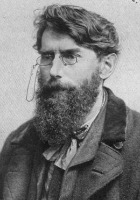George William Russell
George William Russell Poems
HIS head within my bosom lay,
But yet his spirit slipped not through:
I only felt the burning clay
...
YOU remember, dear, together
Two children, you and I,
Sat once in the autumn weather,
...
EVEN as a bird sprays many-coloured fires,
The plumes of paradise, the dying light
Rays through the fevered air in misty spires
...
HER mist of primroses within her breast
Twilight hath folded up, and o’er the west,
Seeking remoter valleys long hath gone,
...
George William Russell Biography
George William Russell who wrote with the pseudonym Æ (sometimes written AE or A.E.), was an Irish nationalist, writer, editor, critic, poet, and artistic painter. He was also a mystical writer, and a the personage of a group of devotees of theosophy in Dublin for many years. Organizer Russell was born in Lurgan, County Armagh. His family relocated to Dublin when he was eleven years old. He was educated at Rathmines School and the Metropolitan School of Art, where he began a lifelong friendship with William Butler Yeats. He started working as a draper’s clerk, then worked many years for the Irish Agricultural Organization Society (IAOS), an agricultural co-operative society initiated by Horace Plunkett during 1894. During 1897 Plunkett needed an able organiser and W. B. Yeats suggested Russell, who became Assistant Secretary of the IAOS. Politician He was an able lieutenant and travelled extensively throughout Ireland as a spokesman for the society, mainly responsible for developing the credit societies and establishing co-operative banks in the south and west of the country the numbers of which increased to 234 by 1910. The pair made a good team, with each gaining much from the association with the other. As an officer of the IAOS he could not express political opinions freely, but he made no secret of the fact hat he considered himself a Nationalist. During the 1913 Dublin Lock-out he wrote an open letter to the Irish Times criticizing the attitude of the employers, then spoke on it in England and helped bring the crisis to an end. He was an independent delegate to the 1917-18 Irish Convention in which he opposed John Redmond's compromise on Home Rule. Publisher Russell was editor from 1905 to 1923 of the Irish Homestead, the journal of the IAOS. His gifts as a writer and publicist gained him a wide influence in the cause of agricultural co-operation. He then became editor of the The Irish Statesman, which merged with the Irish Homestead, from 15 September 1923 until 12 April 1930. With the demise of this newspaper he was for the first time of his adult life without a job, and there were concerns that he could find himself in a state of poverty, as he had never earned very much money from his paintings or books. Unbeknownst to him meetings and collections were organized and later that year at Plunkett House he was presented by Father T. Finlay with a cheque for £800. This enabled him to visit the United States the next year, where he was well received all over the country and his books sold in large numbers. He used the pseudonym "AE", or more properly, "Æ". This derived from an earlier Æ'on signifying the lifelong quest of man, subsequently abbreviated. Writer and artist His first book of poems, Homeward: Songs by the Way (1894), established him in what was known as the Irish Literary Revival, where Æ met the young James Joyce during 1902 and introduced him to other Irish literary figures, including William Butler Yeats. He appears as a character in the "Scylla and Charybdis" episode of Joyce's Ulysses, where he dismisses Stephen's theories on Shakespeare. His collected poems was published during 1913, with a second edition during 1926. His house at 17 Rathgar Avenue in Dublin became a meeting-place at the time for everyone interested in the economic and artistic future of Ireland. His interests were wide-ranging; he became a theosophist and wrote extensively on politics and economics, while continuing to paint and write poetry. Æ claimed to be a clairvoyant, able to view various kinds of spiritual beings, which he illustrated in paintings and drawings. He was noted for his exceptional kindness and generosity towards younger writers: Frank O'Connor termed him " the man who was the father to three generations of Irish writers", and Patrick Kavanagh called him " a great and holy man". He relocated to England after his wife’s death during 1932 and died in Bournemouth during 1935. He is buried in Mount Jerome Cemetery, Dublin.)
The Best Poem Of George William Russell
Freedom
I WILL not follow you, my bird,
I will not follow you.
I would not breathe a word, my bird,
To bring thee here anew.
I love the free in thee, my bird,
The lure of freedom drew;
The light you fly toward, my bird,
I fly with thee unto.
And there we yet will meet, my bird,
Though far I go from you
Where in the light outpoured, my bird,
Are love and freedom too.
George William Russell Comments
George William Russell Quotes
Any relations in a social order will endure, if there is infused into them some of that spirit of human sympathy which qualifies life for immortality.
